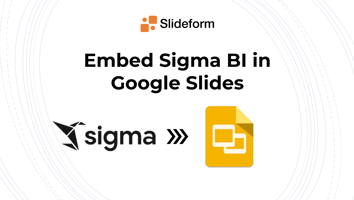If your organization has invested in creating BI dashboards in Tableau, you probably want to use...
How to Embed Tableau Charts, Data, and KPIs in Google Slides
Slideform automation puts your reports on auto-pilot. Embed any content from Tableau into a presentation, apply filters, and set a schedule to update automatically.
Why use slide decks for reporting?
Some may wonder why we are still using Google Slides for client-facing reporting. Well, one reason is that Tableau Viewer licenses are expensive! But there are other good reasons to send your clients a report in slide form.- A Google Slides deck can be customized to each client or exec so they see only the data that is most relevant to them.
- A slide deck does not change over time, so they can always refer back to it.
- Presentation format is easy to step through together during a meeting.
- You can add comments and recommendations that are relevant to the specific data in the slides.
- The slide deck can be styled according to the client's branding guidelines or your corporate style guide.
- You can share the presentation directly with the recipients over email.
What are some options to insert Tableau content into Google Slides?
- The best way to export Tableau charts and visuals directly to your customized Google Slides report is with Slideform. Slideform uses AI-powered automation to map your Tableau content to shapes and text boxes on a Google Slides template. You can apply filters to the data automatically, crop the chart images, set an update schedule, and create multiple presentations at once. Learn more at https://slideform.co.
- You could also manually copy and paste from Tableau to Google Slides. This puts a static image of the visual into your presentation. The limitation is that you have to copy over every single data element and chart, and if the data changes you will have to copy them over again.
How to automatically import Tableau views into Google Slides
-
Connect your Tableau workbook to Slideform
First, create a personal access token in Tableau, then, in Slideform, add the Tableau data source and provide the requested credentials. For more details on setup, see How to Connect A Data Source.
Slideform captures each visual in the worksheet, including charts, tables, maps, and metrics, and makes it available to embed into your Google Slides template. Slideform also extracts all of the data behind each of the visuals. You can use this to fill in text boxes in the presentation and to construct editable tables in your slides.
Here is my sample Tableau dashboard. I want to filter this dashboard to a specific year and category, and then embed the Sales and Profit by Customer chart and the data behind the Customer Ranking chart into a report in Google Slides.
- Connect a slide deck template
Next, you need a template for your presentation. With Slideform, you can use your own custom-branded slide deck. Just start with a previous version of your report and insert placeholders (enclosed in curly braces) for any elements that will change between versions of the report, like text, numbers, tables, images, charts, logos, and names. All the colors, styling, fonts, and sizing of the elements in the template will be carried through to the slide deck output.
Here is an example slide template with placeholders for text and charts that will come from Tableau.

Once you have saved a template, enter the Google Slides URL into Slideform as a New Project. Give your project a name and associate the Tableau data source. - Match Tableau views and metrics to the placeholders
Now, we need to match each placeholder in the slide template to the correct chart or other content that will fill it. Open the project for editing by clicking Configure Data on the project card. Select the data source, then choose the chart or table, and set the anchor position. You can filter the data with any filters that are included in your dashboard, such as date range, category, or region. Tables are embedded as editable, native Google Slides tables.
To pull in a number, such as a KPI or metric, it is a similar process. We pull in the data behind Tableau scorecards and tables and you can filter and perform functions to select the data you want to use. The metric will be embedded as an editable text field in the presentation.
- Generate the Google Slides presentation
Click Generate on the project card to make a new, up-to-date presentation. You can also Set a Schedule for Recurring Presentations to auto-generate and email the slides to you. Or, create several slide decks with different filter settings using Bulk Mode. Awesome, right!
Here is my slide with filters for year and category applied to the Tableau data.
Advantages of Slideform automation:
- No screenshots! And no copying & pasting.
- Set recurring presentations to auto-generate on a schedule!
- Slides are viewable by all recipients; no Tableau license required.
- Data (charts, graphs, numbers) automatically update when you generate a presentation.
- Combine Tableau with other data sources and content including spreadsheets, images, and text.
- Use your own custom slide template in the format of your choice.
Can I embed Tableau visuals into PowerPoint?
Yes! Slideform fully supports PowerPoint format. Slideform automation is the best choice to connect Tableau to your PowerPoint reports.
Start your free trial today!




